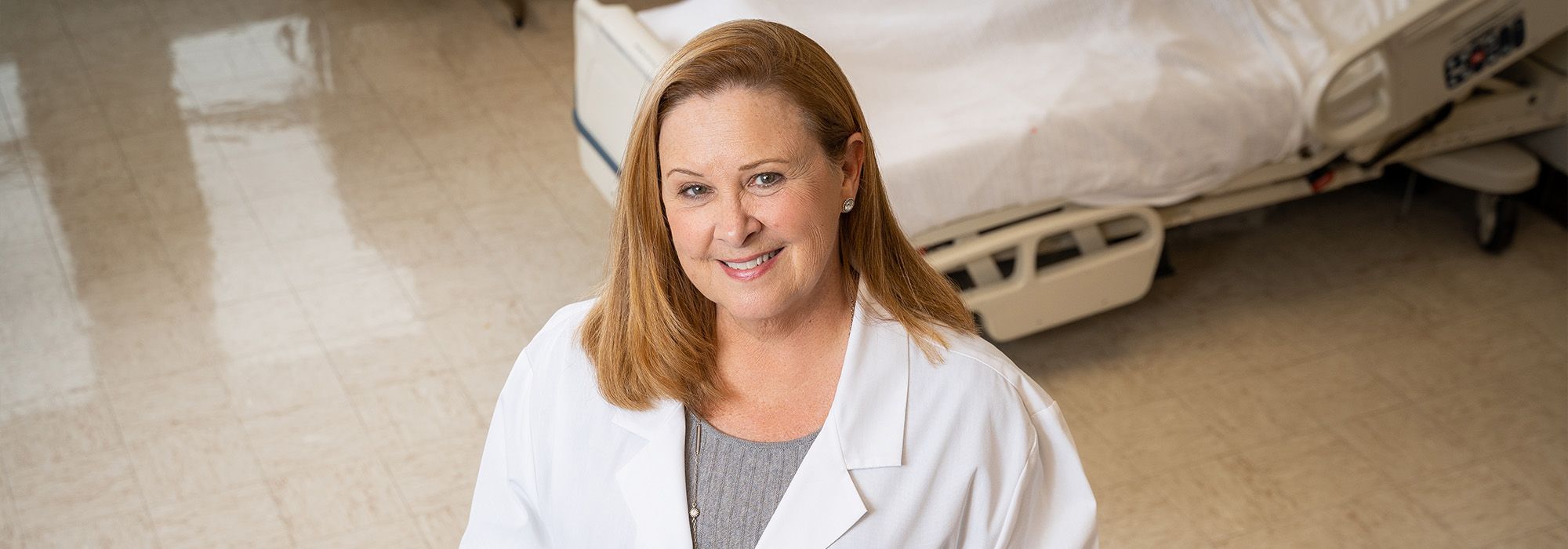
Rita Pickler: Asking the Right Questions
by Melissa L. Weber
There are thousands of faculty members at The Ohio State University conducting ground-breaking research that advances science and changes people’s lives. Each year, the university’s Office of Research selects six renowned faculty members for recognition of their work with the Distinguished Scholar Award. For the first time ever, in 2022, a nurse scientist was recognized.
The announcement came in March, at the beginning of what was billed as a typical faculty meeting. Some members of the college were on campus, and some participated remotely via Zoom. When Associate Dean Mary Beth Happ, PhD, RN, FAAN, FGSA, introduced Ohio State’s Vice President for Research, Peter Mohler, PhD, everyone knew something big was about to happen. He described the award and named Rita Pickler, asking her to wave.
“I didn’t even know I’d been nominated!” said Rita Pickler, PhD, FAAN, the FloAnn Sours Easton Endowed Professor of Child and Adolescent Health and Director of the PhD and Master’s in Nursing Science Programs in the College of Nursing. “It’s such an honor.”
Pickler’s more than 35 years of research focuses on helping preterm infants thrive both in the neonatal intensive care unit (NICU) and after discharge during the initial transition to home.
While preventing premature births remains her ultimate goal, her research has focused on finding the best ways to nurture and care for the 10% of babies born preterm every year in the U.S.
According to Pickler, big changes in neonatal care began about 30 years ago when surfactants became available for premature infants. “For the first time, babies born as early as 28 weeks had a chance of surviving,” said Pickler. The drugs helped their lungs develop. They could breathe, but then other problems became apparent, including their inability to eat.
Pickler’s work related to feeding preterm infants started with a question. “When I finished my PhD at the University of Virginia, I took faculty position at Virginia Commonwealth University,” she said. “My mentor sent me across the street to the NICU at the Medical College of Virginia Hospital to ask the nurses, ‘what do you want to improve?’ And they said, ‘feeding!’”
Remembering that time, Pickler shared a favorite quote. “Einstein once said if he had an hour to save the world, he would spend 55 minutes finding the right question. You can’t solve a problem unless you start with the right questions.”
Helping preterm infants thrive meant asking questions. When should a baby transition from a feeding tube to oral feeding? What are the signs of readiness? Babies have to learn to suck, swallow and breathe. Care must be given to help babies transition to breast or bottle. The oral skills they develop are critical for other skills later on in life, such as talking. Sucking capabilities even factor into proper development of facial structure. “Our approach to feeding affects other tasks,” she said. Study by study, through NIH-funded trials, we have learned ways to improve the care for these infants.
Critical care units like the NICU are protocol driven. “But some babies need different individual care,” said Pickler. “We need to assess and care for individual babies. They speak with their behavior; we must pay attention to that behavior and change our actions to improve a baby’s response and outcomes.”
Pickler has served as principal investigator, co-investigator or significant contributor on 18 externally funded grants and 20 significant internally funded grants. Pickler is also editor of Nursing Research. “We hope our papers are read by the clinicians who are able to take improvements into the hospital,” she said.
The Distinguished Scholar Award includes research funding, and she is still considering options for its use. “The award is a gift that keeps on giving,” she said. In addition to NIH funded grants, she is working with multiple teams in areas that include prematurity prevention and improvement in maternal well-being, birth experiences for mothers, NICU care reliability, and touch and parenting in the NICU. She is particularly interested in supporting young researchers so they have the same good start that she had.
“Ask questions,” she said. “What’s a problem you want to solve? That’s the point of research.”
This September, Pickler was honored with the National Association of Neonatal Nurses (NANN) Lifetime Achievement Award, which recognizes an individual’s longstanding commitment to and profound impact on the field of neonatal nursing. NANN cited her dedication to teaching and mentoring others, volunteer service, research and the advancement of neonatal nursing. Pickler, they said, “is a well-respected and internationally recognized senior scientist due to her many contributions to NICU research and practice … her impact of neonatal nursing and nursing science will be felt by nurses for years to come.”
In this issue
- All in It for the Same Goal: PhDs and DNPs Collaborate
- Celebrating Margaret Graham
- Bringing XR to the Classroom
- Jane E. Heminger Hall Opens
- Impact of Giving
- Well-being Begins with Us
- Rita Pickler: Asking the Right Questions
- New Designation Recognizes EBP Excellence
- Experience Nursing Overseas
- Sam Warren Innovates
- Da'na Langford and the Village of Healing
- Meet OSU Spidey

